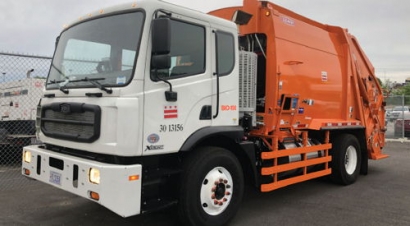
The DPW began an evaluation of the technology in 2018, when the Optimus system was installed on six garbage and recycling trucks. The Vector System allows these medium and heavy-duty vehicles to run on pure biodiesel, a cleaner fuel solution produced from waste fats and oils. The success of the technology prompted the department to amend an existing order of 17 refuse trucks to include the Optimus biodiesel system prior to their delivery to the DPW.
Additionally, in conjunction with delivery of the new B100 vehicles, DPW installed a 12,500 gallon refueling station on-site to support the project expansion. The station is equipped with Optimus’ SMARTFuel RFID technology that limits refueling solely to vehicles that are equipped to utilize B100. The biodiesel fuel for DPW’s trucks is being supplied by North America’s largest producer of biodiesel, Renewable Energy Group (REG).
“As the demand for emissions reduction strategies continues to grow across fleets and municipalities, we are well-positioned to provide B100 and biofuel blending options to our customers,” said Jon Scharingson, executive director, Sales & Marketing for REG. “As REG expands our business downstream, B100 is a cleaner fuel solution we can offer today, and the D.C. Department of Public Works is just one example of how we are doing that.”
The DPW’s switch to biofuels is a part of Washington, D.C.’s efforts to achieve 50% greenhouse gas emission reductions by 2032, with the ultimate goal being an 80% reduction by 2050. DPW diesel refuse trucks present the biggest barrier to these goals, as they cause the highest amount of emissions per vehicle. To address this, the department has looked to the Vector System to dramatically expand the amount of biodiesel utilized without impacting vehicle performance, operation, or maintenance.
B100, however, cannot be used as fuel without some engine modifications, which is where Optimus Technologies’ expertise lies. “DPW is an avid user of lower blends of biodiesel, but to achieve their sustainability commitments, they are in need of something more,” says Colin Huwyler, CEO of Optimus Technologies. “Fleets love that they can utilize their existing vehicle specifications, and just include the Optimus fuel system to achieve significant environmental and performance benefits.”
While the Department has explored electric vehicles (EVs) as an alternative, DPW’s Director Chris Geldart acknowledged that EV technology isn’t available for heavy-duty applications. The most effective solution from both a cost and technology standpoint is to operate on B100 in order to take full advantage of the fuel’s carbon reduction benefits. The success of the Optimus system has encouraged Director Geldart to announce that all future refuse trucks ordered by the department will operate on B100.
“We were looking for a solution to maximize emissions reductions while minimizing any effect on operations,” says Geldart. “In 2019, D.C.’s fleet of trucks consumed over 170,000 gallons of biodiesel, resulting in a carbon reduction of more than 1,598 tons. The Department is driving these numbers higher through the implementation of the Optimus Vector System in more city refuse vehicles and expanding to other heavy-duty applications such as snow removal trucks.”
100% biodiesel allows DPW to exceed their 2050 carbon reduction target with the fleet today, despite heavy duty vehicles presenting one of the biggest challenges to sustainability. The DPW has fully committed to this progress, and intends to have close to 100 trucks upgraded with Optimus Technologies’ biodiesel fuel systems within the next year.

